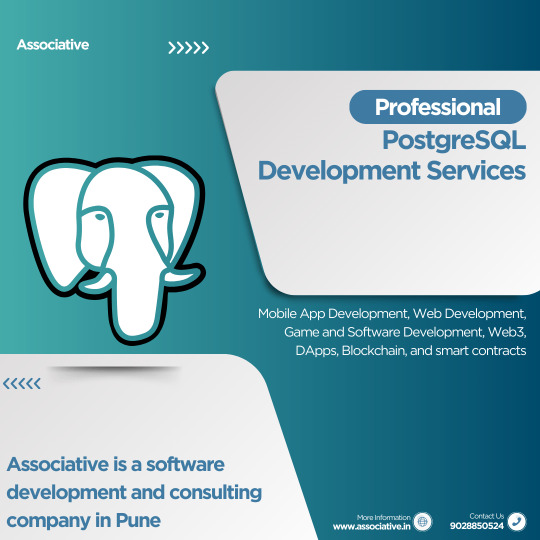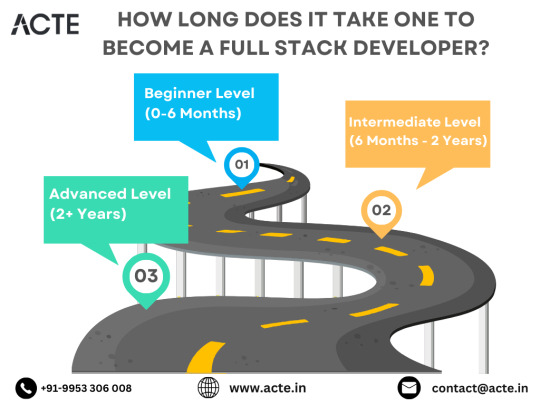#Postgresql Development
Explore tagged Tumblr posts
Text
Looking for Hire PostgreSQL Developers? Our PostgreSQL Development Services Company in India specializes in efficient, scalable solutions for robust and high-performance database applications. We specialize in leveraging PostgreSQL's power to increase the performance of your website and mobile applications.
#PostgreSQL Development Services#PostgreSQL Development Company#PostgreSQL Development#PostgreSQL Development Services in India#Hire a PostgreSQL Developer
0 notes
Text
PostgreSQL Development: Unleashing The Power Of Open Source Databases With Associative

In the realm of modern software development, the choice of a reliable and robust database management system (DBMS) is paramount. PostgreSQL, an open-source relational database system, has emerged as a top contender due to its flexibility, extensibility, and strong community support. In the bustling tech landscape of Pune, India, Associative is leading the charge in PostgreSQL development, offering innovative solutions and expert consulting services to businesses worldwide.
Understanding PostgreSQL Development
PostgreSQL, often referred to as Postgres, is renowned for its adherence to SQL standards, ACID compliance, and support for advanced features such as JSON, XML, and full-text search. Its extensibility allows developers to create custom data types, functions, and even procedural languages, enabling tailored solutions for diverse use cases.
At Associative, PostgreSQL development isn’t just about deploying a database; it’s about harnessing its full potential to address complex business requirements. Whether it’s designing efficient schemas, optimizing query performance, or implementing high availability and disaster recovery solutions, Associative’s expertise ensures seamless PostgreSQL integration into any project.
Leveraging Open Source Advantage
As an open-source solution, PostgreSQL offers numerous advantages over proprietary databases. With no licensing fees, businesses can allocate resources more efficiently, investing in innovation rather than software costs. Moreover, the open nature of PostgreSQL fosters a vibrant community of developers, continually enhancing the database with new features, security patches, and performance optimizations.
Associative leverages the power of open source to deliver cost-effective PostgreSQL solutions without compromising on quality or reliability. By actively contributing to the PostgreSQL community and staying abreast of the latest developments, Associative ensures that clients benefit from cutting-edge technologies and best practices in database management.
Tailored Solutions For Every Need
In today’s competitive landscape, one-size-fits-all solutions seldom suffice. Associative understands this reality and offers personalized PostgreSQL development services tailored to each client’s unique requirements. Whether it’s building scalable web applications, data warehousing solutions, or real-time analytics platforms, Associative collaborates closely with clients to deliver bespoke PostgreSQL solutions that drive business growth and innovation.
Associative’s team of seasoned developers possesses a deep understanding of PostgreSQL internals, enabling them to tackle even the most challenging database-related tasks with confidence. From performance tuning and scalability enhancements to data migration and schema design, Associative empowers businesses to unlock the full potential of PostgreSQL for their projects.
Future-Proofing With Associative
In an era of rapid technological advancement, future-proofing your software infrastructure is essential. Associative goes beyond mere development, providing comprehensive consulting services to help businesses navigate the evolving landscape of data management and analytics. Whether it’s adopting emerging PostgreSQL features, implementing cloud-native solutions, or devising data governance strategies, Associative equips clients with the knowledge and expertise needed to stay ahead of the curve.
By partnering with Associative for PostgreSQL development and consulting, businesses gain a competitive edge in today’s data-driven world. With a proven track record of delivering high-quality solutions and a commitment to customer satisfaction, Associative is the trusted partner for organizations seeking to harness the full potential of PostgreSQL for their projects.
Conclusion
PostgreSQL development is more than just deploying a database; it’s about leveraging the power of open source to drive innovation and achieve business objectives. Associative, with its expertise in PostgreSQL development and consulting, offers a compelling proposition for businesses looking to harness the full potential of this powerful database system. From personalized solutions to comprehensive consulting services, Associative empowers businesses to thrive in the ever-evolving landscape of data management and analytics.
0 notes
Text
Custom PostgreSQL Development Services - Fidel Softech
In today's digital landscape, data plays a pivotal role in informed decision-making and business expansion. PostgreSQL emerges as a preferred choice, valued for its flexibility, reliability, and widespread adoption across global enterprises. However, maximizing PostgreSQL's potential often requires customized solutions. Many businesses turn to tailored development services to precisely meet their unique needs, enhancing PostgreSQL's capabilities, performance, and fulfilling specific requirements. This article explores the advantages of custom PostgreSQL development services and their role in optimizing data architecture for businesses.
At Fidel, a leading PostgreSQL development company, our skilled PostgreSQL Developers leverage the platform's capabilities to facilitate efficient data storage, management, and scalability for businesses. We provide customized PostgreSQL development services covering installation, configuration, and timely support and maintenance.

What Are Custom PostgreSQL Development Services?
Custom PostgreSQL development services encompass a range of offerings tailored to adapt PostgreSQL databases to meet specific business requirements. These services are typically delivered by experienced database administrators, developers, and consultants well-versed in PostgreSQL's architecture and functionalities.
Our PostgreSQL Development Services
PostgreSQL Consulting: Benefit from insights from our seasoned team of database architects and developers who offer expert guidance on Database Management Systems (DBMS) and associated applications, maximizing returns on PostgreSQL investments.
PostgreSQL Development: Streamline PostgreSQL development with a robust data management infrastructure tailored to business growth, ensuring outcome-oriented solutions aligned with unique requirements.
PostgreSQL Performance Optimization: Enhance PostgreSQL database performance with comprehensive tuning services, optimizing settings and configurations for improved efficiency.
PostgreSQL Administration: As a premier provider of PostgreSQL management services, we deliver agile solutions ensuring resilient data handling systems that support business operations.
PostgreSQL Database Migration: Stay updated with seamless PostgreSQL database migration services, facilitating smooth transitions to the latest configurations and mitigating maintenance challenges.
Conclusion
Custom PostgreSQL development services empower businesses to harness PostgreSQL deployments fully, crafting scalable, high-performance databases and applications tailored to specific requirements. Collaboration with experienced developers enables organizations to optimize data infrastructure and thrive in a data-centric landscape, efficiently achieving business objectives.
0 notes
Text
Postgresql Development Services misses out on certain features however the developer can either create them or choose to install them through third-party extensions. The database makes use of a language known as PGSQL for creating procedures and also implementing other programming languages.
0 notes
Text


Bootcamp week 5 - day one <datebase> ✨
#postgresql#learn sql#bootcamp#software development#learn to code#coding#codeblr#programming#webdevelopment#womanintech#progblr
8 notes
·
View notes
Text
Exporting a PostgreSQL Database with Windows CMD.
Exportar Una Base de Datos PostgreSQL con CMD de Windows.
👉 https://blog.nubecolectiva.com/exportar-una-base-de-datos-postgresql-con-cmd-de-windows/

#software development#web development#100daysofcode#developerlife#web developers#developers#devs#worldcode#developers & startups#backenddevelopment#postgresql#cmd#windows
0 notes
Text
🔴🚀 ¡Próximamente! Curso de Multi Tenant con Django 5 y Docker 🏢✨
youtube
Estoy emocionado de anunciar que estoy preparando un nuevo curso sobre Multi Tenant con Django 5. En este curso, aprenderás a crear aplicaciones multi-tenant robustas y escalables utilizando Django 5 y todas las herramientas en sus últimas versiones.
🔍 ¿Qué aprenderás?
❏ Configuración de entornos multi-tenant con entornos aislados y entornos compartidos (sucursales) ❏ Uso de Docker para la contenedorización y despliegue. ❏ Gestión de bases de datos y esquemas. ❏ Implementación de seguridad y autenticación. ❏ Optimización y escalabilidad. ❏ Y mucho más…
Este curso está diseñado para desarrolladores de todos los niveles que quieran llevar sus habilidades de Django al siguiente nivel. ¡No te lo pierdas!
🔔 Suscríbete y activa las notificaciones para no perderte ninguna actualización.
¡Nos vemos en el curso! 🚀
👉 Haz clic aquí para acceder a los cursos con descuento o inscribirte 👈 https://bit.ly/cursos-mejor-precio-daniel-bojorge
#django#python#web#tenant#multi tenant#multitenant#saas#saas technology#teaching#code#developers & startups#education#programming#postgresql#software#Docker#Youtube
0 notes
Text
Using Django with PostgreSQL Database
Learn how to set up and configure Django to use PostgreSQL, a powerful open-source database. Follow this step-by-step guide to integrate PostgreSQL with your Django application.
Introduction PostgreSQL is a powerful, open-source object-relational database system that is widely used in the industry. Combining PostgreSQL with Django, a high-level Python web framework, provides a robust and scalable solution for web application development. This guide will walk you through the process of setting up a Django application with a PostgreSQL database, covering everything from…

View On WordPress
0 notes
Text
Looking for Hire PostgreSQL Developers Our PostgreSQL Development Services Company in India specializes in efficient, scalable solutions for robust and high performance database applications
#PostgreSQL Development Services#Hire a PostgreSQL Developer#Hire a developer in India#PostgreSQL Development Company
0 notes
Text
youtube
#nest js#nestjs framework#nestjs project#nestjs development#nestjs#typescript development#typescript class#typescript tutorial#typescript#youtube#video#codeonedigest#microservices#microservice#typeorm#orm#object relation mapping#postgres tutorial#postgres database#postgresql#postgres#Youtube
0 notes
Text
The Full Stack Developer Journey: A 10-Point Path to Mastery
In today’s rapidly evolving tech landscape, the role of a full stack developer has gained significant prominence. A full stack developer is a versatile professional who possesses a wide range of skills and can handle both front-end and back-end development. In this blog post, we will explore who a full stack developer is, the skills required, and present a 10-point path to embark on the journey…
View On WordPress
#adaptability#angular#API development#back-end development#collaboration#CSS#deployment#DevOps#front-end development#full stack developer#Git#HTML#JavaScript#lifelong learning#MongoDB#MySQL#Node.js#PostgreSQL#Python#React#ruby on rails#server administration#version control#Vue.js#web development
0 notes
Text
While businesses have recently begun to take advantage of PostgreSQL, developers have been using Postgresql Development Services for a long time.
0 notes
Text
The Roadmap to Full Stack Developer Proficiency: A Comprehensive Guide
Embarking on the journey to becoming a full stack developer is an exhilarating endeavor filled with growth and challenges. Whether you're taking your first steps or seeking to elevate your skills, understanding the path ahead is crucial. In this detailed roadmap, we'll outline the stages of mastering full stack development, exploring essential milestones, competencies, and strategies to guide you through this enriching career journey.

Beginning the Journey: Novice Phase (0-6 Months)
As a novice, you're entering the realm of programming with a fresh perspective and eagerness to learn. This initial phase sets the groundwork for your progression as a full stack developer.
Grasping Programming Fundamentals:
Your journey commences with grasping the foundational elements of programming languages like HTML, CSS, and JavaScript. These are the cornerstone of web development and are essential for crafting dynamic and interactive web applications.
Familiarizing with Basic Data Structures and Algorithms:
To develop proficiency in programming, understanding fundamental data structures such as arrays, objects, and linked lists, along with algorithms like sorting and searching, is imperative. These concepts form the backbone of problem-solving in software development.
Exploring Essential Web Development Concepts:
During this phase, you'll delve into crucial web development concepts like client-server architecture, HTTP protocol, and the Document Object Model (DOM). Acquiring insights into the underlying mechanisms of web applications lays a strong foundation for tackling more intricate projects.
Advancing Forward: Intermediate Stage (6 Months - 2 Years)
As you progress beyond the basics, you'll transition into the intermediate stage, where you'll deepen your understanding and skills across various facets of full stack development.

Venturing into Backend Development:
In the intermediate stage, you'll venture into backend development, honing your proficiency in server-side languages like Node.js, Python, or Java. Here, you'll learn to construct robust server-side applications, manage data storage and retrieval, and implement authentication and authorization mechanisms.
Mastering Database Management:
A pivotal aspect of backend development is comprehending databases. You'll delve into relational databases like MySQL and PostgreSQL, as well as NoSQL databases like MongoDB. Proficiency in database management systems and design principles enables the creation of scalable and efficient applications.
Exploring Frontend Frameworks and Libraries:
In addition to backend development, you'll deepen your expertise in frontend technologies. You'll explore prominent frameworks and libraries such as React, Angular, or Vue.js, streamlining the creation of interactive and responsive user interfaces.
Learning Version Control with Git:
Version control is indispensable for collaborative software development. During this phase, you'll familiarize yourself with Git, a distributed version control system, to manage your codebase, track changes, and collaborate effectively with fellow developers.
Achieving Mastery: Advanced Phase (2+ Years)
As you ascend in your journey, you'll enter the advanced phase of full stack development, where you'll refine your skills, tackle intricate challenges, and delve into specialized domains of interest.
Designing Scalable Systems:
In the advanced stage, focus shifts to designing scalable systems capable of managing substantial volumes of traffic and data. You'll explore design patterns, scalability methodologies, and cloud computing platforms like AWS, Azure, or Google Cloud.
Embracing DevOps Practices:
DevOps practices play a pivotal role in contemporary software development. You'll delve into continuous integration and continuous deployment (CI/CD) pipelines, infrastructure as code (IaC), and containerization technologies such as Docker and Kubernetes.
Specializing in Niche Areas:
With experience, you may opt to specialize in specific domains of full stack development, whether it's frontend or backend development, mobile app development, or DevOps. Specialization enables you to deepen your expertise and pursue career avenues aligned with your passions and strengths.
Conclusion:
Becoming a proficient full stack developer is a transformative journey that demands dedication, resilience, and perpetual learning. By following the roadmap outlined in this guide and maintaining a curious and adaptable mindset, you'll navigate the complexities and opportunities inherent in the realm of full stack development. Remember, mastery isn't merely about acquiring technical skills but also about fostering collaboration, embracing innovation, and contributing meaningfully to the ever-evolving landscape of technology.
#full stack developer#education#information#full stack web development#front end development#frameworks#web development#backend#full stack developer course#technology
9 notes
·
View notes
Text

The Comprehensive Guide to Web Development, Data Management, and More
Introduction
Everything today is technology driven in this digital world. There's a lot happening behind the scenes when you use your favorite apps, go to websites, and do other things with all of those zeroes and ones — or binary data. In this blog, I will be explaining what all these terminologies really means and other basics of web development, data management etc. We will be discussing them in the simplest way so that this becomes easy to understand for beginners or people who are even remotely interested about technology. JOIN US
What is Web Development?
Web development refers to the work and process of developing a website or web application that can run in a web browser. From laying out individual web page designs before we ever start coding, to how the layout will be implemented through HTML/CSS. There are two major fields of web development — front-end and back-end.
Front-End Development
Front-end development, also known as client-side development, is the part of web development that deals with what users see and interact with on their screens. It involves using languages like HTML, CSS, and JavaScript to create the visual elements of a website, such as buttons, forms, and images. JOIN US
HTML (HyperText Markup Language):
HTML is the foundation of all website, it helps one to organize their content on web platform. It provides the default style to basic elements such as headings, paragraphs and links.
CSS (Cascading Style Sheets):
styles and formats HTML elements. It makes an attractive and user-friendly look of webpage as it controls the colors, fonts, layout.
JavaScript :
A language for adding interactivity to a website Users interact with items, like clicking a button to send in a form or viewing images within the slideshow. JOIN US
Back-End Development
The difference while front-end development is all about what the user sees, back end involves everything that happens behind. The back-end consists of a server, database and application logic that runs on the web.
Server:
A server is a computer that holds website files and provides them to the user browser when they request it. Server-Side: These are populated by back-end developers who build and maintain servers using languages like Python, PHP or Ruby.
Database:
The place where a website keeps its data, from user details to content and settings The database is maintained with services like MySQL, PostgreSQL, or MongoDB. JOIN US
Application Logic —
the code that links front-end and back-end It takes user input, gets data from the database and returns right informations to front-end area.

Why Proper Data Management is Absolutely Critical
Data management — Besides web development this is the most important a part of our Digital World. What Is Data Management? It includes practices, policies and procedures that are used to collect store secure data in controlled way.
Data Storage –
data after being collected needs to be stored securely such data can be stored in relational databases or cloud storage solutions. The most important aspect here is that the data should never be accessed by an unauthorized source or breached. JOIN US
Data processing:
Right from storing the data, with Big Data you further move on to process it in order to make sense out of hordes of raw information. This includes cleansing the data (removing errors or redundancies), finding patterns among it, and producing ideas that could be useful for decision-making.
Data Security:
Another important part of data management is the security of it. It refers to defending data against unauthorized access, breaches or other potential vulnerabilities. You can do this with some basic security methods, mostly encryption and access controls as well as regular auditing of your systems.
Other Critical Tech Landmarks
There are a lot of disciplines in the tech world that go beyond web development and data management. Here are a few of them:
Cloud Computing
Leading by example, AWS had established cloud computing as the on-demand delivery of IT resources and applications via web services/Internet over a decade considering all layers to make it easy from servers up to top most layer. This will enable organizations to consume technology resources in the form of pay-as-you-go model without having to purchase, own and feed that infrastructure. JOIN US
Cloud Computing Advantages:
Main advantages are cost savings, scalability, flexibility and disaster recovery. Resources can be scaled based on usage, which means companies only pay for what they are using and have the data backed up in case of an emergency.
Examples of Cloud Services:
Few popular cloud services are Amazon Web Services (AWS), Microsoft Azure, and Google Cloud. These provide a plethora of services that helps to Develop and Manage App, Store Data etc.
Cybersecurity
As the world continues to rely more heavily on digital technologies, cybersecurity has never been a bigger issue. Protecting computer systems, networks and data from cyber attacks is called Cyber security.
Phishing attacks, Malware, Ransomware and Data breaches:
This is common cybersecurity threats. These threats can bear substantial ramifications, from financial damages to reputation harm for any corporation.
Cybersecurity Best Practices:
In order to safeguard against cybersecurity threats, it is necessary to follow best-practices including using strong passwords and two-factor authorization, updating software as required, training employees on security risks.
Artificial Intelligence and Machine Learning
Artificial Intelligence (AI) and Machine Learning (ML) represent the fastest-growing fields of creating systems that learn from data, identifying patterns in them. These are applied to several use-cases like self driving cars, personalization in Netflix.
AI vs ML —
AI is the broader concept of machines being able to carry out tasks in a way we would consider “smart”. Machine learning is a type of Artificial Intelligence (AI) that provides computers with the ability to learn without being explicitly programmed. JOIN US
Applications of Artificial Intelligence and Machine Learning: some common applications include Image recognition, Speech to text, Natural language processing, Predictive analytics Robotics.
Web Development meets Data Management etc.
We need so many things like web development, data management and cloud computing plus cybersecurity etc.. but some of them are most important aspects i.e. AI/ML yet more fascinating is where these fields converge or play off each other.
Web Development and Data Management
Web Development and Data Management goes hand in hand. The large number of websites and web-based applications in the world generate enormous amounts of data — from user interactions, to transaction records. Being able to manage this data is key in providing a fantastic user experience and enabling you to make decisions based on the right kind of information.
E.g. E-commerce Website, products data need to be saved on server also customers data should save in a database loosely coupled with orders and payments. This data is necessary for customization of the shopping experience as well as inventory management and fraud prevention.
Cloud Computing and Web Development
The development of the web has been revolutionized by cloud computing which gives developers a way to allocate, deploy and scale applications more or less without service friction. Developers now can host applications and data in cloud services instead of investing for physical servers.
E.g. A start-up company can use cloud services to roll out the web application globally in order for all users worldwide could browse it without waiting due unavailability of geolocation prohibited access.
The Future of Cybersecurity and Data Management
Which makes Cybersecurity a very important part of the Data management. The more data collected and stored by an organization, the greater a target it becomes for cyber threats. It is important to secure this data using robust cybersecurity measures, so that sensitive information remains intact and customer trust does not weaken. JOIN US
Ex: A healthcare provider would have to protect patient data in order to be compliant with regulations such as HIPAA (Health Insurance Portability and Accountability Act) that is also responsible for ensuring a degree of confidentiality between a provider and their patients.
Conclusion
Well, in a nutshell web-developer or Data manager etc are some of the integral parts for digital world.
As a Business Owner, Tech Enthusiast or even if you are just planning to make your Career in tech — it is important that you understand these. With the progress of technology never slowing down, these intersections are perhaps only going to come together more strongly and develop into cornerstones that define how we live in a digital world tomorrow.
With the fundamental knowledge of web development, data management, automation and ML you will manage to catch up with digital movements. Whether you have a site to build, ideas data to manage or simply interested in what’s hot these days, skills and knowledge around the above will stand good for changing tech world. JOIN US
#Technology#Web Development#Front-End Development#Back-End Development#HTML#CSS#JavaScript#Data Management#Data Security#Cloud Computing#AWS (Amazon Web Services)#Cybersecurity#Artificial Intelligence (AI)#Machine Learning (ML)#Digital World#Tech Trends#IT Basics#Beginners Guide#Web Development Basics#Tech Enthusiast#Tech Career#america
4 notes
·
View notes